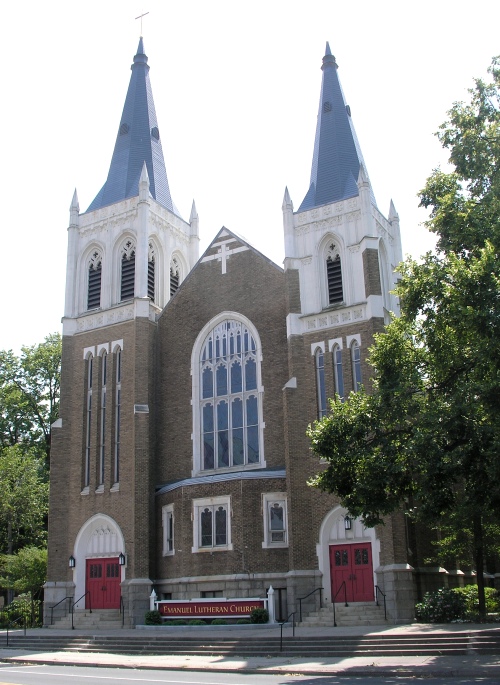 | |
| Emanuel Lutheran Church, founded by Swedish Evangelical Lutherans, Hartford, CT |
Churches are mostly 501c3 and donations are tax exempt for the donor—there are millions of these and in order to change that you’d have to go after the huge violators that are fronts for political action like the Clinton Foundation or George Soros’ spidery web of groups. Until Lyndon Johnson's run for Senate, churches weren’t muzzled (it's called the Johnson Amendment to the tax code, 1954)--and probably isn't even legal, but its never gone to the Supreme Court. Just the threat of a law suit keeps pastors quiet. If churches have a business, (selling books, running restaurants, etc.) those profits are taxable, but in the normal sense of the word, they don’t have profits.
These days, everything is political, even marriage and gender. Do you really want churches not concerned about dirty air or lead in the water in Flint? Should being tax exempt prevent a pastor from preaching about prison reform, or the condition of the local schools, or the merger of a local hospital or chaos on the school board, corruption on city council or child pornography, or trafficking in persons or marriage or abortion? Some local, state or federal politician or political party has a stake in it for personal gain, I guarantee.
I vote at a Catholic church; our Lutheran church is also a polling place. In our old neighborhood it was at an Episcopal Church. Can you imagine the scramble for spaces if all churches didn’t donate space for voting, or food pantries? They also sponsor Scouting and Boys and Girls clubs and AA, blood drives, and art and music events (non-religious) as well as literacy classes. Our church has a huge Muslim and Hispanic population for ESL. Want to stop that? (Actually, proselytizing is forbidden due to government rules because some Vista volunteers are employed.)
The tradition of not taxing churches predates our country's establishment because religion isn’t just what happens in the building or your personal prayer closet, but what believers take into the community. In the Middle Ages, Kings and monarchs didn’t take care of the poor, or educate them, or run the hospitals, the churches did that (still do). However, our country was settled by people fleeing a state controlled church, so our first amendment is written to prevent the state from interfering with churches, although some are confused about that.
When you hear the phrase, “I’m spiritual, but not religious,” think of the misunderstanding it represents (usually heard from lapsed Christians). That was not Jesus’ command. He established communion, baptism, a hierarchy for service, honored his mother, performed his first miracle at a wedding, preached to large gatherings, observed many Jewish laws and traditions and sent missionaries, etc. That’s being religious.
I vote at a Catholic church; our Lutheran church is also a polling place. In our old neighborhood it was at an Episcopal Church. Can you imagine the scramble for spaces if all churches didn’t donate space for voting, or food pantries? They also sponsor Scouting and Boys and Girls clubs and AA, blood drives, and art and music events (non-religious) as well as literacy classes. Our church has a huge Muslim and Hispanic population for ESL. Want to stop that? (Actually, proselytizing is forbidden due to government rules because some Vista volunteers are employed.)
The tradition of not taxing churches predates our country's establishment because religion isn’t just what happens in the building or your personal prayer closet, but what believers take into the community. In the Middle Ages, Kings and monarchs didn’t take care of the poor, or educate them, or run the hospitals, the churches did that (still do). However, our country was settled by people fleeing a state controlled church, so our first amendment is written to prevent the state from interfering with churches, although some are confused about that.
When you hear the phrase, “I’m spiritual, but not religious,” think of the misunderstanding it represents (usually heard from lapsed Christians). That was not Jesus’ command. He established communion, baptism, a hierarchy for service, honored his mother, performed his first miracle at a wedding, preached to large gatherings, observed many Jewish laws and traditions and sent missionaries, etc. That’s being religious.
Black churches particularly are very active politically. And as far as I know, no government entity has removed any politician campaigning from their pulpits. Barack Obama created his political career speaking in black churches in the Chicago area—learned his speaking style there (he didn’t become a Christian until after college), because he grew up in Hawaii and Indonesia and wasn't familiar with the cadence or how to sound "black."
I personally believe (and it’s not a popular belief) churches should “donate” the real estate tax value of their land because in many small communities that have mega churches, it removes huge swaths from the tax rolls. Also, some churches have bought up old, decaying sections of malls, which cleans up the area and reduces crime, but also removes property from tax rolls. And from the obvious wealth of some TV preachers’ lifestyle (Creflo Dollar and Joyce Meyer for instance), I believe someone needs to keep a closer eye on the books, not for tax purposes, but for their own souls and credibility.






No comments:
Post a Comment